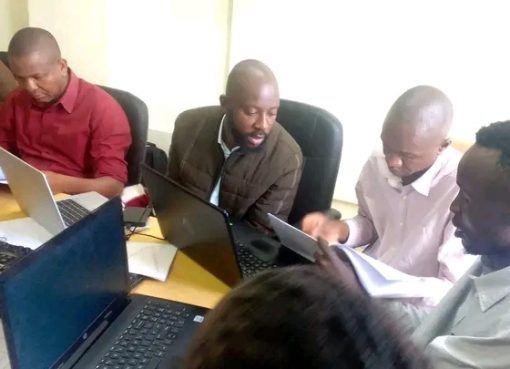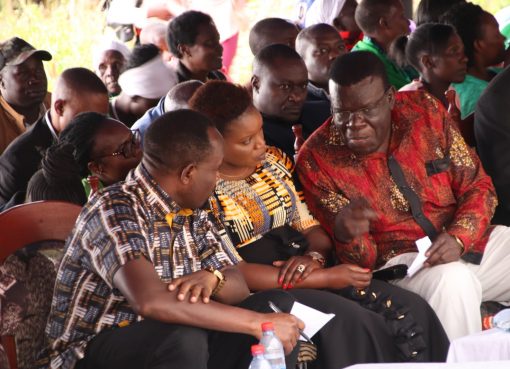For many years, the use of chemical fertilizers has been common practice among most farmers in Trans Nzoia County.
Many farmers use DAP and CAN for both planting and top dressing to manage the growth of their crops especially maize.
The narrative however may change with a farmer from Cherangany Sub County who has established a vermiculture unit to raise earthworms with the intention of obtaining organic fertilizers that could be used in organic farming.
The farmer, James Wafula, 53, established the unit on his farm initially to use as part of his research on climate change and adaptation under the African Climate Leadership Programme sponsored by International Development Research Centre (IDRC). Along the way, he developed an interest in uptake full farming as the returns were encouraging.
“My research is based on the production and use of vermicompost. I was interested in this project because it has the potential of helping farmers use locally available materials to produce fertilizers for use in their farms which will also reduce input costs,” he notes.
To start with, Wafula, who is pursuing a degree in Climate Change and Adaptation, says he bought 10 kilograms of earthworms early last year from a farmer in Nairobi at a cost of Sh2 500 per kilogram.
He then introduced them on a small plot as a trial on his farm. He has constructed bins cut from large liquid containers and put in metal frames.
He explains that after obtaining the earthworms, he made vermibedding- which is the material that the earthworms stay in.
He says that vermibedding should have good aeration with good moisture holding capacity of about 90 per cent moisture content.
According to Wafula, the earthworms can feed on any foodstuff material apart from meat, oily substances, fried foodstuff, and citrus fruits.
“But anything else can be chopped up to make the composting process faster and placed in the vermibedding. A week after you place it, it will no longer be there since the earthworms will have consumed it and excreted worm castings which are your worm compost,” he points out.
The process continues and after four months, the earthworms would have excreted enough worm castings where a farmer can choose to continue feeding them to produce more or harvest and replace with other vermibedding to start the process afresh.
“For any earthworm enthusiasts you will find that you keep on improving because the earthworms keep increasing with time,” he says.
To one of his six bins, Wafula placed 5 kilograms of banana stems and leaves both chopped up and used as vermibedding. He also placed 2 kilograms of maize stalks, 2kilograms of soil and introduced 3kilograms of earthworms.
He says after four months, he harvested 8.5 kilograms of earthworms from that bin and obtained 60 kilograms of vermicompost manure.
“I was doing a trial on what I can produce but I would have produced a lot,” said the father of three.
According to the farmer, he tests his vermicompost at the Kenya Agricultural and Livestock Research Organization (KALRO) to test the composition of nitrogen, potassium, phosphorus and the PH levels.
“I need to have a good idea of what will be in the compost and how beneficial it will be for that particular crop. I need to know the nutritional value of the compost that is why I test at the laboratories,” says Wafula.
For now, he says he is trying to use different vermibedding and food for the earthworms to determine whether they could lead to an increase in the percentage of the elements in the vermicompost manure that would be harvested for purposes of improving production.
He says he is scaling his earthworm farming to the next level after noting that they fetch good prices from both the earthworms and the vermicompost manure while targeting to enter into a contract with farmers and producers to supply enough vermicompost and earthworms.
“I have produced a good number of earthworms that I can now move to the next level of having a natural continuous flow system so that I can supply to some of the established consumers,” he notes.
Already three farmers from his locality have embraced the farming and bought some earthworms from him to kick start their process.
“The community members welcomed the project since I had interacted with them when I was working at the Ministry of Energy in the project of disseminating and promotion of biogas plants among communities,” he notes.
He says he helped to establish a number of biogas units in Kitale and the neighbouring counties up to central Kenya and Kisii. With this interaction, when he was establishing the vermicompost, they showed interest to adopt.
Wafula says he intends to establish plots to demonstrate the use of the vermicompost. To one plot he will use chemical fertilizers, to another he will use vermicompost and use conventional compost in the next plot as part of his tests.
He advises farmers to embrace earthworm farming noting that anybody could do it provided they took it seriously.
He notes that the project could minimize the use of chemical fertilizers which were becoming harmful to the environment, wildlife and human beings.
“People are now getting concerned with what they are consuming and they are moving away from the use of chemical fertilizers to organic farming. Irrigation schemes are recommending the use of organic fertilizers. All the environmental, social impact analysis has a place somewhere that they recommend the use of organic fertilizers as opposed to chemical fertilizers,” he explains.
The farmer, however, notes that the growth of earthworm farming among local farmers is slow paced due to the requirement for one to be a member of the Kenya Institute of Organic farmers to be certified and allowed to sell compost.
“To be a member of the Kenya Institute of Organic Farmers and Organic Co-producers one has to show that they are able to produce organic compost that has less harmful pathogens,” he adds.
According to Wafula, the temperatures in the compost piles should reach an accepted maximum in order to make unfavourable conditions for the pathogens.
According to a soil scientist at KALRO Kitale Dr. Keziah Mageroi vermicomposting is a technology which involves converting organic waste especially using some specific species of earthworms.
“This really helps especially in the conversion of organic waste into a better product that can be used in agriculture. This process uses some earthworms which are called red earthworms. These earthworms have a high appetite. They are able to feed on large compost bins and they also breed very quickly and that means that they are able to multiply very first so that they can be able to work on organic waste,” she disclosed.
She says that a farmer could use the vermicompost for different purposes such as the foliar feed for what is called vermity or vermicompost tea it can be used as foliar feed. The resulting compost could also be used in the gardens like the normal compost farmyard manure and it could also be used as a soil conditioner.
Once applied in the soil, it could increase the number of micro-organisms present in the soil. She advises farmers who have compost manure to introduce the earthworms so that they can have well decomposed manure within a very short time.
She notes that vermicompost could be used to increase the level of carbon in the soil. “Most of the soils have little organic matter and the use of the technology is highly recommended to improve the amount of organic matter in the soils,” she added.
By Moses Wekesa/ Marion Chebet/Pauline Ikanda
Friday, November 22, 2024




